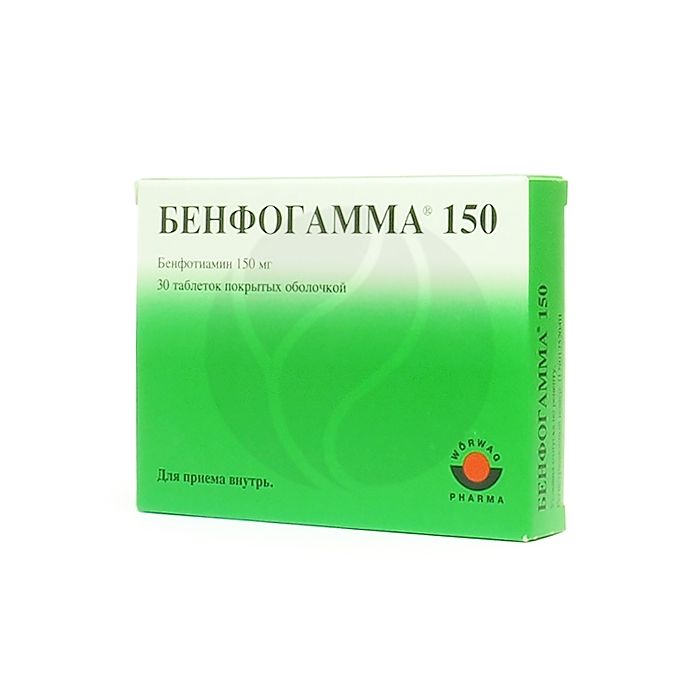Benfogamma tablets 150mg, No. 30
Expiration Date: 05/2027
Russian Pharmacy name:
Бенфогамма таблетки 150мг, №30
B1 deficiency confirmed by clinical and biochemical studies, developing against the background of:
inadequate and malnutrition (beriberi);
parenteral nutrition for a long time, hemodialysis;
chronic alcoholism (alcoholic cardiomyopathy, Wernicke's encephalopathy, Korsakov's syndrome);
increased need for vitamin B1.
Polyneuropathy due to vitamin B1 deficiency. Typical signs of this deficiency are neurological disorders in the form of neuropathies with sensory impairments (pain, tingling sensation, loss of sensation in the upper and lower extremities).
For the treatment of vitamin B1 deficiency: 1 tablet once a day.
For the treatment of polyneuropathies caused by vitamin B1 deficiency: an initial dose of 1 tablet 2 times a day for 3 weeks, then 1 tablet daily.
The duration of treatment depends on its effectiveness and is determined by the doctor.
The tablet is taken without chewing, with a small amount of water.
One coated tablet contains:
Active ingredient : benfotiamine - 150 mg,
Excipients : microcrystalline cellulose 122.0 mg, povidone K-30 8.0 mg, fatty acids glycerides 5.0 mg, colloidal silicon dioxide 7.0 mg, sodium carmellose 3.0 mg, talc 10.0 mg;
Shell composition : shellac 3.0 mg, sucrose 70.875 mg, calcium carbonate 66.479 mg, talc 41.314 mg, acacia gum 10.155 mg, corn starch 7.340 mg, titanium dioxide 10.932 mg, colloidal silicon dioxide 4.404 mg, povidone K-30 6.210 mg, macrogol-6000 1.597 mg, glycerol 85% 2.262 mg, polysorbate 80 0.133 mg, glycol mountain wax 0.300 mg.
Increased individual sensitivity to the components of the drug,
deficiency of sucrose / isomaltose,
fructose intolerance, glucose-galactose malabsorption,
1 period of pregnancy,
childhood.
Trade name of the drug : BenfogammaЃ 150
International Non-Proprietary Name (INN) : Benfotiamine.
Dosage form : coated tablets
Ingredients :
One coated tablet contains:
Active ingredient : benfotiamine - 150 mg,
Excipients : microcrystalline cellulose 122.0 mg, povidone K-30 8.0 mg, fatty acids glycerides 5.0 mg, colloidal silicon dioxide 7.0 mg, sodium carmellose 3.0 mg, talc 10.0 mg;
Shell composition : shellac 3.0 mg, sucrose 70.875 mg, calcium carbonate 66.479 mg, talc 41.314 mg, acacia gum 10.155 mg, corn starch 7.340 mg, titanium dioxide 10.932 mg, colloidal silicon dioxide 4.404 mg, povidone K-30 6.210 mg, macrogol-6000 1.597 mg, glycerol 85% 2.262 mg, polysorbate 80 0.133 mg, glycol mountain wax 0.300 mg.
Description : white, round, biconvex, shiny tablets.
Pharmacotherapeutic group : vitamin.
ATX code ј11DA03
Pharmacological action
Benfotiamine is a fat-soluble thiamine derivative. Thiamine is converted into active thiamine pyrophosphate and, as a coenzyme, is included in the pyruvate decarboxylase, alpha-ketoglutarate decarboxylase complexes, which are involved in the oxidative decarboxylation of pyruvic and alpha-ketoglutaric acids; transketolases - an enzyme of the pentose phosphate shunt.
Pharmacokinetics
Absorption - high, throughout the small intestine. Before absorption, it is released from the bound state by digestive enzymes. After 15 minutes it is found in the blood, after 30 minutes - in other tissues. In the blood, the concentration is relatively low, while free thiamine circulates in the plasma, while its phosphorus esters circulate in erythrocytes and leukocytes. Phosphorylation occurs in the liver. The most active phosphoric ester is thiamine diphosphate, which has coenzyme activity. It accumulates mainly in the liver, heart, brain, kidneys, spleen. 1/2 of the total is contained in striated muscles and myocardium and about 40% in internal organs. It is excreted through the intestines and kidneys.
Indications for use
B1 deficiency confirmed by clinical and biochemical studies, developing against the background of:
inadequate and malnutrition (beriberi);
parenteral nutrition for a long time, hemodialysis;
chronic alcoholism (alcoholic cardiomyopathy, Wernicke's encephalopathy, Korsakov's syndrome);
increased need for vitamin B1.
Polyneuropathy due to vitamin B1 deficiency. Typical signs of this deficiency are neurological disorders in the form of neuropathies with sensory impairments (pain, tingling sensation, loss of sensation in the upper and lower extremities).
Contraindications
Increased individual sensitivity to the components of the drug,
deficiency of sucrose / isomaltose,
fructose intolerance, glucose-galactose malabsorption,
1 period of pregnancy,
childhood.
Application during pregnancy and lactation
Pregnancy is a contraindication for the use of the drug.
Method of administration and dosage
For the treatment of vitamin B1 deficiency: 1 tablet once a day.
For the treatment of polyneuropathies caused by vitamin B1 deficiency: an initial dose of 1 tablet 2 times a day for 3 weeks, then 1 tablet daily.
The duration of treatment depends on its effectiveness and is determined by the doctor.
The tablet is taken without chewing, with a small amount of water.
Side effect
Allergic reactions: angioedema, urticaria, pruritus.
Overdose
Not observed.
Interaction with other medicinal products
Thiamine weakens the effect of depolarizing muscle relaxants (suxamethonium iodide, etc.), is inhibited by fluorouracil.
Ethanol slows down the rate of absorption of thiamine after oral administration.
special instructions
In the elderly, there were no adverse reactions other than the above.
It is not recommended to take a double dose of the drug if the previous dose was missed.
In Wernicke's encephalopathy, the administration of dextrose should be preceded by the administration of thiamine.
Influence on the ability to drive vehicles and mechanisms
There is no data on the effect of the drug on the ability to drive vehicles and mechanisms, used in therapeutic doses.
Release form
Film-coated tablets 150 mg. 15 coated tablets in a blister made of polyvinyl chloride film and aluminum foil; 2 or 4 blisters, together with instructions for use, are placed in a cardboard box.
Storage conditions
At a temperature not higher than 25 ? C.
Keep out of the reach of children.
Shelf life
5 years.
Do not use after the expiration date.
Conditions of dispensing from pharmacies
On prescription.

